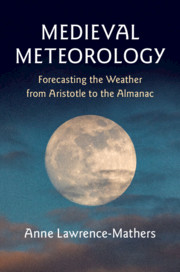Book contents
- Medieval Meteorology
- Medieval Meteorology
- Copyright page
- Contents
- Preface
- Acknowledgements
- Introduction
- 1 Recreating Meteorology in the Early Middle Ages
- 2 Meteorology, Weather Forecasting and the Early Medieval Renaissance of Astronomy
- 3 Exploratory Encounters with the Work of Arab Astronomers and Meteorologists
- 4 Meteorology, the New Science of the Stars and the Rise of Weather Forecasting
- 5 The Contested Rise of Astrometeorology
- 6 Applying the Science of Astrometeorology
- 7 Astrometeorology and Mechanisation
- 8 Weather Forecasting and the Impact of Print
- Conclusion
- Bibliography
- Index
7 - Astrometeorology and Mechanisation
Published online by Cambridge University Press: 08 November 2019
- Medieval Meteorology
- Medieval Meteorology
- Copyright page
- Contents
- Preface
- Acknowledgements
- Introduction
- 1 Recreating Meteorology in the Early Middle Ages
- 2 Meteorology, Weather Forecasting and the Early Medieval Renaissance of Astronomy
- 3 Exploratory Encounters with the Work of Arab Astronomers and Meteorologists
- 4 Meteorology, the New Science of the Stars and the Rise of Weather Forecasting
- 5 The Contested Rise of Astrometeorology
- 6 Applying the Science of Astrometeorology
- 7 Astrometeorology and Mechanisation
- 8 Weather Forecasting and the Impact of Print
- Conclusion
- Bibliography
- Index
Summary
Chapter 7 considers astrometeorology as an established branch of knowledge, within the context of fourteenth-century developments in astronomy and technology. Mechanical clocks were prominent products of these advances, as were more accurate astrolabes and planetary tables. Most successful of the latter were the Alfonsine Tables, used by the authors of new and more ambitious treatises of astrometeorology, such as Firminus de Bellavalle. The chapter analyses the new approaches taken by inventors like Richard of Wallingford and scholars like John of Eschenden, and traces the growing prominence of Merton College, Oxford, in this field. Eschenden’s fame as a forecaster was boosted by his claim to have predicted the great plague of 1348. Related to this is the survival of his weather forecasts for 1348 to 1374. The chapter considers the rise of weather observation, and the survival of records from Lincolnshire, Oxford, Wurzburg and Basel, as evidence of a drive to give astrometeorology an empirical backing. It concludes that astrometeorology grew as an area of expert practice, despite the attacks that critics such as Nicole Oresme made against the reliability of all forms of astrology.
Keywords
- Type
- Chapter
- Information
- Medieval MeteorologyForecasting the Weather from Aristotle to the Almanac, pp. 152 - 172Publisher: Cambridge University PressPrint publication year: 2019

